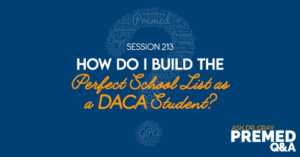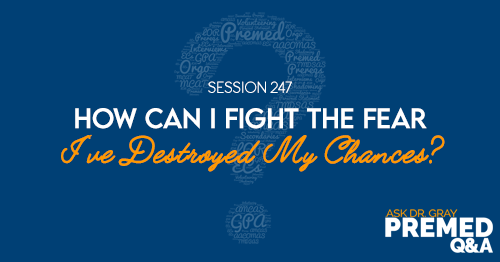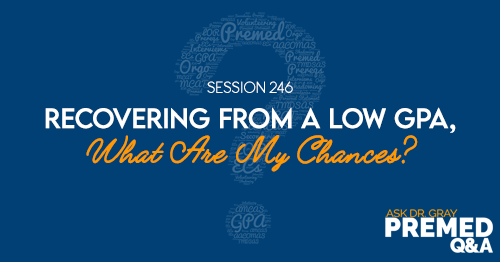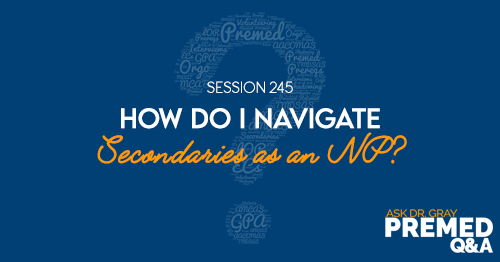Apple Podcasts | Google Podcasts
Session 213
This DACA student wants to know how to build a good school list that reflects their specific needs.
Ask Dr. Gray: Premed Q&A is brought to you by Blueprint MCAT. Listen to this podcast episode with the player above, or keep reading for the highlights and takeaway points.
The episodes in this podcast are recordings of our Facebook Live that we do at 3 pm Eastern on most weekdays. Check out our Facebook page and like the page to be notified. Also, listen to our other podcasts on MedEd Media. If you have any questions, call me at 617-410-6747.
[00:37] Question of the Day
Q: How does one build the perfect school list? (Natalie from New York is a premed who is also a DACA (Deferred Action for Childhood Arrivals)
A: Conduct a school-by-school search to find out which schools specifically accept DACA students. While it may seem challenging, there are helpful resources available like a simple Google search that will show a list of medical schools that accept DACA students. This approach narrows down the search and provides relevant information.
[01:32] What to Do After Establishing Eligibility
Q: The student asks about the subsequent steps in building a strong school list once eligibility for medical school is determined. In addition, she asked what considerations should be kept in mind and what questions she should ask herself.
She’s asking about the importance of evaluating public versus private schools, aligning with their mission statements, and how she can incorporate this information into her search process. The student is also asking if the MSAR (Medical School Admission Requirements), is a helpful resource for finding the right schools after establishing her eligibility.
A: Check out the Premed Years Podcast Episode 437 can be used as a valuable resource for creating an optimal school list. Moreover, it is important to disregard statistics as the primary factor and instead consider other aspects of each school.
These factors include the curriculum, location, outreach programs, international opportunities, and whether the school is located in an urban or rural setting. Building a school list requires time and effort, and there are no shortcuts available.
“It takes some work. It takes some effort on your part. So just try to figure out what you think will work best for you.”Click To Tweet[04:59] Choosing Between Studying for MCAT or Submitting the Application
Q: The student is currently working on her primary application and has delayed her MCAT until the end of the month. She is feeling overwhelmed and unsure about her next steps. She is asking whether to prioritize studying for my MCAT or focus on completing and submitting her application as soon as possible. She would like to know what would be the recommended course of action in this situation.
A: It is an impossible question to answer definitively. Both studying for the MCAT and completing the application are important, but there is time constraint. It is important to perform well on the MCAT and the need to submit the application in a timely manner is crucial too.
Ideally, the application should have been submitted earlier. Taking the test at the end of July is already past the recommended timeline. However, it’s still possible to take the test, but it means the application will be submitted later than desired.
[06:23] Proofreading Personal Statement
Q: The student is done with her application but will still proofread it once before submitting it. She mentioned she followed the advice given she received to focus less on her experience with a specific physician. But instead, emphasize her personal journey and what sparked her interest in healthcare. She proceeds to read a paragraph from her personal statement and asks for feedback on whether she is heading in the right direction with her writing.
A: Based on the blurb read, the person reading it can visualize the student’s actions and observe their interaction with a patient. The way the personal statement was written, one can recognize how it sparked a desire within the applicant to do more. This is what one aims for in a personal statement.
[10:59] Advice on How to Get Out of a Slump
Q: The student is asking what are some strategies to overcome a performance slump, especially when feeling stuck when faced with challenging passages (like the difficult AAMC section passages on the MCAT).
How can one regain confidence and be motivated to continue studying and improve one’s performance after experiencing a significant setback? (like struggling with the first six passages in Volume One after performing well on Jack Westin passages.)
A: Analyze and reflect on your performance in order to identify the reasons behind your difficulties with a particular passage. Consider various factors such as language complexity, passage length, level of interest, or any other aspects that may have affected your performance negatively.
By understanding the specific block or challenge, one can continuously make adjustments and strive for improvement in one’s approach to similar passages in the future.
[11:48] Language as Cause of Difficulty
The student acknowledged that it was the language that she was having a hard time with since the passages were too convoluted.
The best advice is to ignore negative self-talk and avoid getting caught up in thoughts about your performance or difficulties while reading challenging passages. Struggling with difficult passages is common and not limited to non-native English speakers.
The key is to focus on reading the passage without letting negative thoughts consume working memory, as it hinders comprehension.
Give yourself grace, acknowledge that there will be unfamiliar words or confusing sentences, and continue to read through the passage with perseverance. Rest assured, you are not alone in experiencing difficulties with these passages.
[17:03] Resources to be Updated on Healthcare and Political Topics
Q: Are there any other recommended resources that provide up-to-date information on current healthcare and political topics and other relevant healthcare discussions?
A: Use Google as a resource to gather information on current topics related to healthcare and politics. The podcast “Congressional Dish” can be a resource to stay informed about events happening in Congress. Set up Google Alerts for specific topics of interest to receive daily emails with updates on those topics.
[17:52] Coping with Stress
Q: The student is asking for additional advice for individuals who are experiencing constant stress, like her, and what are ways to cope with it.
A: Prioritize self-care, such as getting enough sleep, staying hydrated, and engaging in regular exercise. Also, submit the application as soon as possible. Moreover, consider waiting until after taking the MCAT if receiving secondary essays early would cause additional stress.
[18:45] On Submitting Application After Taking MCAT
Q: The student asked if submitting the application after taking the MCAT would be too late. The situation is not ideal. You need to consider the potential consequences of submitting the application before the MCAT.
A: One must weigh the impact of having secondary essays in your inbox during MCAT preparation, whether it would be a distraction or will it affect your overall performance. It’s for you to think about and weigh out.
[19:31] Applying for DO
Q: The student is considering applying to only one school initially in the hope that she won’t receive secondary applications from other schools, thereby reducing her workload. However, she also plans to apply to DO (Doctor of Osteopathic Medicine) schools, which introduces some uncertainty about her overall application strategy.
A: Do not worry about DO schools at the moment because their application timeline is longer. The verification process for DO schools is quicker, taking days instead of weeks. Focus on the AMCAS application first. Also, do not be concerned if you decide to apply to only one school initially. However, even with applying to just one school, there is a possibility of receiving a secondary application soon after submission.
Links:
Premed Years Podcast Episode 437
Medical School HQ Facebook page
Medical School HQ YouTube channel
Instagram @MedicalSchoolHQ
Join the Application Academy!
The Premed Playbook: Guide to the Medical School Personal Statement
The Premed Playbook: Guide to the Medical School Application Process
SEARCH SITE
LISTEN FOR FREE












